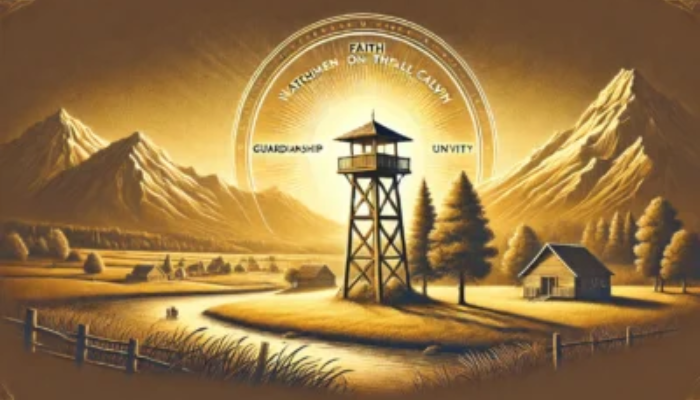Welcome to an exploration of Watchmenontheall Calvin, a term that resonates deeply within theological and literary circles. This phrase encapsulates a wealth of spiritual insight and intellectual rigor, largely attributed to its Calvinist roots. Whether you are a scholar, a spiritual seeker, or simply curious about its implications, this article offers a comprehensive guide. From its origins to its modern-day relevance, we delve into everything you need to know about Watchmenontheall Calvin and its profound impact.
The Origins of Watchmenontheall Calvin
The Calvinist Influence
The term “Watchmenontheall Calvin” is deeply embedded in Calvinist theology, a tradition stemming from John Calvin, a key figure of the Protestant Reformation. Calvin’s emphasis on predestination, divine sovereignty, and scripture as the ultimate authority has influenced countless generations. Watchmen, often referenced in biblical texts, symbolize vigilance and moral responsibility—qualities central to Calvinist thought. By merging these concepts, “Watchmenontheall Calvin” represents a commitment to spiritual oversight and doctrinal purity.
Historical Context
The 16th-century Reformation was a turbulent era of religious upheaval, challenging established norms and redefining Christianity. Within this context, “Watchmenontheall Calvin” emerged as a metaphorical expression, reflecting the call for spiritual guardianship amidst societal change. Calvinists, seen as “watchmen,” took on roles of theological leadership and moral accountability, shaping communities with their disciplined approach.
The Theological Significance of Watchmenontheall Calvin
A Call to Spiritual Vigilance
The imagery of the watchman is prominent in biblical scripture, notably in Ezekiel 33:7: “So you, son of man, I have made a watchman for the house of Israel.” Calvinist interpreters expanded on this by framing it as a call to spiritual leaders to guide and protect their congregations. “Watchmenontheall Calvin” signifies the unwavering dedication to upholding divine truths in the face of worldly distractions and challenges.
Interpreting Divine Sovereignty
Calvinism’s core tenet of divine sovereignty finds expression in “Watchmenontheall Calvin.” This concept underscores God’s ultimate authority over human affairs, with watchmen serving as earthly representatives. They embody the tension between divine control and human responsibility, a dynamic that remains a cornerstone of Calvinist doctrine.
Modern-Day Applications of Watchmenontheall Calvin
Relevance in Contemporary Faith
In today’s rapidly changing world, “Watchmenontheall Calvin” continues to inspire faith communities. Its principles encourage believers to remain steadfast in their convictions and proactive in their spiritual practices. Churches influenced by Calvinist theology often adopt watchman-like roles, emphasizing discipleship, ethical leadership, and social justice.
Cultural and Literary Resonance
Beyond theology, “Watchmenontheall Calvin” has permeated literature and culture, symbolizing vigilance and moral clarity. Writers and thinkers draw on its themes to address modern ethical dilemmas, from governance to environmental stewardship. Its versatility as a metaphor ensures its continued relevance across diverse contexts.
Challenges and Critiques Surrounding Watchmenontheall Calvin
Misinterpretations and Misuses
While “Watchmenontheall Calvin” is a source of inspiration, it is not without controversy. Critics argue that its emphasis on vigilance can sometimes lead to legalism or rigidity within religious communities. Misinterpretations may overshadow the grace-centric aspects of Calvinism, creating an unbalanced view of faith.
Balancing Tradition and Adaptation
Another challenge lies in applying traditional Calvinist principles to contemporary issues. As society evolves, so too must interpretations of “Watchmenontheall Calvin.” Striking a balance between preserving doctrinal integrity and embracing modern perspectives is a continual struggle for theologians and practitioners alike.
The Enduring Legacy of Watchmenontheall Calvin
Influence on Global Christianity
The legacy of “Watchmenontheall Calvin” is evident in its far-reaching influence. From the establishment of Reformed churches to its impact on education and governance, Calvinist principles have shaped societies worldwide. The watchman’s role, as envisioned by Calvin, continues to inspire leaders to prioritize integrity and accountability.
A Timeless Message
At its core, “Watchmenontheall Calvin” offers a timeless message: the importance of vigilance, faithfulness, and moral responsibility. As new generations grapple with spiritual and ethical challenges, the wisdom encapsulated in this phrase provides valuable guidance. Its enduring appeal lies in its ability to transcend time and culture, speaking to universal human experiences.
Conclusion
“Watchmenontheall Calvin” is more than a phrase; it is a profound call to action and reflection. Rooted in Calvinist theology, it challenges believers to embrace vigilance and uphold divine truths in every aspect of life. From its historical origins to its modern-day implications, its significance remains undiminished. Whether explored through theological study or practical application, “Watchmenontheall Calvin” offers enduring insights for those seeking a deeper understanding of faith and purpose.
FAQs
- What does “Watchmenontheall Calvin” mean? It symbolizes spiritual vigilance and accountability, rooted in Calvinist theology.
- Who was John Calvin? John Calvin was a 16th-century theologian and reformer whose teachings shaped Protestant Christianity.
- What is the role of a watchman in scripture? A watchman serves as a spiritual guardian, warning and guiding the faithful.
- Why is “Watchmenontheall Calvin” significant today? It inspires contemporary faith communities to uphold moral and spiritual integrity.
- How does Calvinism view divine sovereignty? Calvinism emphasizes God’s supreme authority over all aspects of life.
- What are the challenges of “Watchmenontheall Calvin”? Balancing traditional theology with modern perspectives and avoiding legalism are key challenges.
- How has “Watchmenontheall Calvin” influenced literature? Its themes of vigilance and morality have inspired writers addressing ethical dilemmas.
- Is “Watchmenontheall Calvin” relevant outside of religion? Yes, its principles resonate in areas like governance and social ethics.
- What is the connection between watchmen and Calvinist thought? Calvinists interpret watchmen as leaders tasked with maintaining doctrinal purity and moral accountability.
- Where can I learn more about “Watchmenontheall Calvin”? Exploring Calvinist writings and modern commentaries is a great starting point



